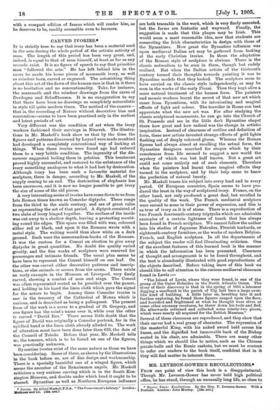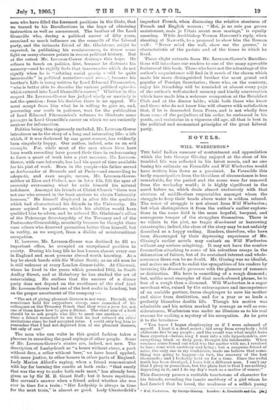• Bygone Years: Recollections. By the Hon. F. Leveson-Gower. With
a Portrait.. London : John Murray. [12a. net.]
Granville who, during a political career of fifty years, exercised so much influence on the councils of the Liberal party, and the intimate friend of Mr. Gladstone, might be expected, in publishing his reminiscences, to throw some light on many obscure points in recent political history. But at the outset Mr. Leveson-Gower destroys this hope. lie refuses to touch on politics, first, because he distrusts his memory—and he rightly feels that inaccuracies which do not signify when he is "relating social gossip wsuld be quite inexcusable" in political narrative—and sect':, % because his brother's Life is being written by Lord Edmond Fitzmanrice, "who is better able to describe the various political episodes which entered into Lord Granville's career." Whether in this respect Mr. Leveson-Gower has judged wisely or unwisely is not the question : from his decision there is no appeal. We must accept from him what be is willing to give us, and, possessing our souls in patience, wait for the publication of Lord Edmond Fitzmaurice's volumes to illustrate some passages in Lord Granville's career on which we are curiously envious for information.
Politics being thus rigorously excluded, Mr. Leveson-Gower introduces us to the story of a long and interesting life: a life which, if it was darkened by one great sorrow, has evidently been singularly happy. Our author, indeed, sets us an evil example. For, while most of the men whose lives have been worth recording have passed their time in endeavouring to force a quart of work into a pint measure, Mr. Leveson- Gower, with rare intervals, has had his quart of time available for his pint of work. Born in the purple—his father served as Ambassador at Brussels and at Paris—and succeeding to adequate, and even ample, means, Mr. Leveson-Gower, neither at Eton and Oxford, nor in later life, felt the spur of necessity overcoming what he calls himself his natural indolence. Amongst his friends at Christ Church "there was not one who seemed in the least anxious to obtain University honours." He himself displayed in after life the qualities which had characterised his friends in the University. He never aspired to positions which his abilities would have qualified him to adorn, and lie refused Mr. Gladstone's offers of the Patronage Secretayship of the Treasury and of the Postmaster-Generalship, nominally because he thought there were others who deserved promotion better than himself, but in reality, as we suspect, from a dislike of uniutermittent occupation.
• If, however, Mr. Leveson-Gower was destined to fill no important office, he occupied an exceptional position in society. During his long life he has known almost every one in England and most persons abroad worth knowing. As a boy he shook hands with Sir Waller Scott; as an old man he is still welcome at every London dinner-table. At Chiswick, where he lived in the years which preceded 1862, in South Audley Street, and at Holmbury he has studied the art Of entertaining. He realises that the success of a dinner party does not depend on the excellence of the chef (and Mr. Leveson-G-ower had one of the best cooks in London), but on the proper assortment of the company :—
"The art of giving pleasant dinners is not easy. Disraeli, who sometimes held his supporters cheap, once remarked of his colleagues on the Treasury Bench that they were a poor lot, not one of them knew how to give a dinner. The chief aim of a host should be to ask people who like to meet one another. . . . . . Once a friend remarked to me that he had refused six other invitations since he had accepted mine. I could only beg him to remember that I had not deprived him of six pleasant dinners, but only of one."
The man who can write in this genial fashion takes a pleasure in recording the good sayings of other people. Some of Mr. Leveson-Gower's stories are, indeed, not new. The
description of Lanhydrook as "a house without cheer, a park -without deer, a cellar without beer," we have heard applied,
with more justice, to other houses in other parts of t ngland.
Lady Marian Alford's saying, when a friend remonstrated with her for burning the candle at both ends : "that surely that was the way to make both ends meet," has already been
given us by Sir X. E. Grant Duff; but it bears repetition. Her servant's answer when a-friend asked whether she was
ever in time for a train : "Her Ladyship is always in time for the next train," is almost as good. Lady Chesterfield's
imperfect French, when discussing the relative stoutness of French and English women : "Moi, je no snis pm grosse maintenant, mais je l'etais avant mon manage," is equally amusing. While Archbishop Vernon Harcourt's reply, when shooting at Naworth, to a proposal to show him the Roman wall: "Never mind the wall, show me the grouse," is characteristic of the prelate and of the times in which he lived.
These slight extracts from Mr. Leveson-Gower's Recollec- tions will introduce our readers to one of the many agreeable features of this book. Those who have not the advantage of the author's acquaintance will find in it much of the charm which made his snore distinguished brother the most genial and popular of Foreign Secretaries; those who, on the contrary, enjoy his friendship will be reminded at almost every page of the author's well-stocked memory and kindly conversation which have made him a welcome companion at the Breakfast Club and at the dinner table ; while both those who know and those who do not know him will observe with satisfaction that, if be is descended from Peers, and is not wholly free from some of the prejudices of his order, he embraced in his youth, and maintains in a vigorous old age, all that is best in the political and economical principles of the great Liberal party.
NOVELS.











































 Previous page
Previous page